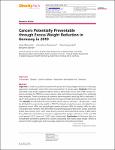Cancers Potentially Preventable through Excess Weight Reduction in Germany in 2010
Wienecke, Antje
Neuhauser, Hannelore
Kraywinkel, Klaus
Barnes, Benjamin
Objective: In order to quantify the preventive potential of body weight reduction in Germany, population-attributable risks (PARs) were estimated for 13 cancer types. Methods: PARs were calculated using body weight prevalence from a nationwide survey from 1998, cancer incidence estimates for 2010 from cancer registry data and relative risk estimates from published meta-analyses. Three counterfactual scenarios were evaluated: reducing BMI to maximally 21 kg/m² (main analysis) and weight reductions among overweight and obese persons of 5% and 10%.
Results: An estimated 9% of all incident cancer cases in Germany - 40,748 cases - could be attributed to excess body weight in 2010. The highest proportions were estimated for endometrial cancer (48%) and oesophageal adenocarcinoma (48% for women, 46% for men). The largest case numbers were estimated for postmenopausal breast (9,081 cases), colorectal (8,002 cases among men, 3,297 cases among women) and endometrial cancer (5,468 cases). The additional counterfactual scenarios suggested that weight reductions of 5% and 10% could prevent 5,572 cases and 11,427 cases, respectively.
Conclusions: In Germany there is a considerable preventive potential for cancers associated with excess body weight. Efforts to prevent further weight gain and encourage weight loss should be promoted.
Files in this item

